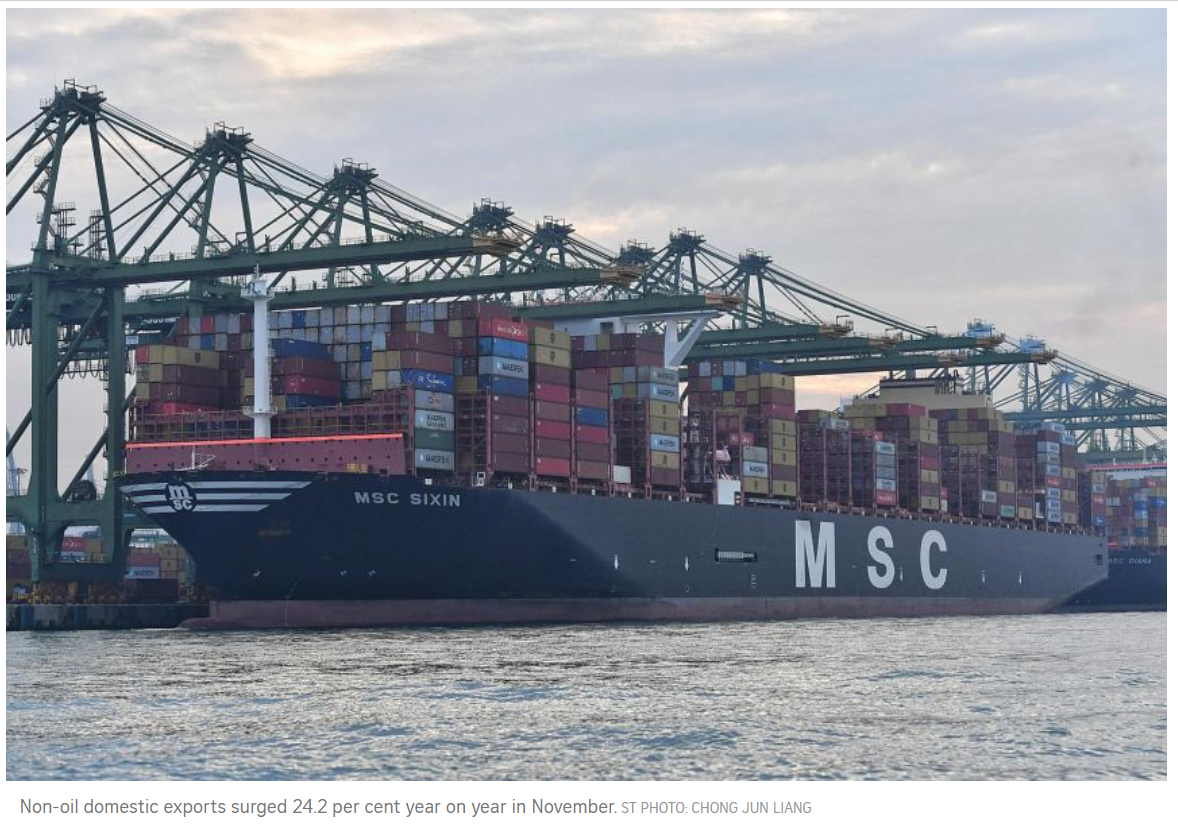Singapore non-oil exports surge 24.2% in November, biggest jump in nearly 10 years
SINGAPORE – Singapore’s key exports defied supply chain disruptions and continued challenges from the Covid-19 pandemic to rack up their biggest increase in almost 10 years last month.
Non-oil domestic exports (Nodx) surged 24.2 per cent year on year, extending the revised 17.8 per cent increase in October and growing for the 12th straight month, according to data released by government agency Enterprise Singapore (ESG) on Friday (Dec 17).
November’s growth was the biggest year-on-year rise in Nodx since February 2012 when shipments jumped 30.3 per cent.
It also blew past economists’ median forecast of 15.3 per cent growth, according to a Bloomberg poll.
Electronics shipments expanded 29.2 per cent in November, against 14.9 per cent in October, thanks to growth in segments such as personal computers, integrated circuits and disk media products.
Meanwhile, non-electronics exports rose 22.7 per cent year on year, following the 18.8 per cent increase in October. This was largely due to specialised machinery, petrochemicals and primary chemicals.
On a seasonally adjusted month-on-month basis, Nodx edged up 1.1 per cent in November, extending the 4.1 per cent growth in October, to hit $16.5 billion.
JPMorgan analyst Ong Sin Beng said that the strong headline figure was boosted by a surge in electronics exports, while the continuous rise in non-electronics and non-pharmaceutical exports aligns with a backdrop of steady external demand.
Nodx strength is expected to persist in the next few months as supply chain bottlenecks ease, he added.
UOB senior economist Alvin Liew said the better-than-expected Nodx and overall trade numbers in November will give a boost to Singapore’s growth outlook for the fourth quarter.
Favourable base effects coupled with export growth momentum in October and November have contributed to “material upside surprise” to Nodx for the last three months of the year, he said.
“While the favourable base effect may wear off a bit for the upcoming December data, the strong momentum for electronics exports could still add to a strong Nodx finish for 2021,” Mr Liew added.
He said that full-year Nodx growth “will likely exceed 10 per cent in 2021”, which would surpass both UOB’s forecast of 9.5 per cent and last year’s 4.3 per cent expansion.
Mr Irvin Seah, senior economist at DBS Bank, noted that electronics exports remained resilient despite expectations that demand for semiconductors would flatten. This, alongside non-electronics exports growth, reaffirms the overall recovery picture, he said.
He does not expect the new Omicron variant to derail trade performance, given that the global economy has adjusted to disruptions during the Covid-19 pandemic and global trade had rebounded quickly from the shock seen at the start of the pandemic last year.
However, Mr Seah highlighted the need to temper expectations for gross domestic product and trade growth in 2022, in part due to the high base seen in 2021 and given that central banks have turned hawkish amid inflation risks.
Last month, ESG upgraded its forecast for Nodx growth to between 9.5 per cent and 10 per cent year on year in 2021, from the previous 7 per cent to 8 per cent projection.
This would mark the fastest pace of growth since 2010, when exports expanded by 22.8 per cent.
Total merchandise trade growth for the year is tipped to come between 17 per cent and 17.5 per cent for 2021.
Nodx to the top markets rose overall in November, even as exports to Thailand declined. China, Taiwan and South Korea were the largest contributors to the rise.
At the same time, exports to emerging markets grew 54.2 per cent in November, continuing the 42 per cent surge in October, supported by demand from the likes of South Asia and Latin America.
Total trade expanded 31.6 per cent in November, following October’s 24 per cent growth. Total exports increased 31.3 per cent, while total imports grew 31.9 per cent.
Trade growth in November reflected the increase in both oil and electronics trade, ESG said, noting that oil trade expanded 120 per cent in November, reversing a 42 per cent decline seen the same month a year ago.



 Thailand
Thailand




